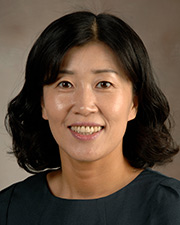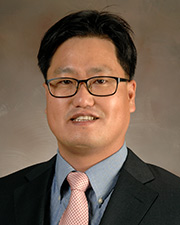Novel glioblastoma treatment research published in Neuro-Oncology

Recent research on the discovery of a novel therapeutic treatment using the oncolytic virus to treat patients with glioblastoma, led by Ji Young Yoo, PhD, associate professor, and Tae Jin Lee, PhD, assistant professor in the Vivian L. Smith Department of Neurosurgery, has been published in Neuro-Oncology.
The team’s research focused on identifying a potential new therapeutic option for patients with glioblastoma (GBM), which is considered one of the worst forms of brain tumor. They hypothesized that using the Oncolytic virus, approved by the FDA in 2015 for use in melanoma patients due to its superior safety and efficacy profiles, could be a viable option to treat GBM, which does not have many therapies available.
“One of its kind, oncolytic herpes simplex virus (oHSV), branded as Delytact, was recently granted conditional approval in Japan for recurrent GBM patients,” Yoo said. “Although OV is a promising cancer therapy, cumulating data from human clinical trials show a limited benefit in a small subset of patients with a robust and remarkable long-term response, which indicates the existence of a resistance mechanism of tumors limiting the therapeutic efficacy of OVs.”

The lab conducted a global transcriptome analysis by sequencing the entire expression profiling of RNAs using GBM-patient-derived primary tumor cells treated with OVs in order to identify a unique gene expression signature governing the mechanism of OV resistance in the tumor cells. This analysis identified Insulin-like Growth Factor 2 (IGF2) as a key factor in OV resistance, which had never been previously reported.
The data showed that IGF2 expression and secretion leads to the resistance of efficient replication and the spread of viruses within the tumor. This led to the lab’s creation of a novel OV called oHSV-D11mt, which expresses a decoy receptor for IGF2 as a single-agent modality and showed significantly higher efficiency of replication and spreading in GBM tumors than unmodified OVs. Additionally, they discovered that that their OV is able to reprogram immune cells within the tumor microenvironment to enhance anti-tumor immunity, which is critical to the overall efficacy of OV-mediated immune activation called viro-immunotherapy.
“Our study unveiled a new resistance mechanism conveyed by an interplay between tumor cells and the surrounding tumor microenvironment and developed a new viro-immunotherapy disabling the OV resistance to achieve better therapeutic outcomes,” Yoo said. “For the first time, our study discovered the involvement of IGF2 in OV resistance and designed a new virus that can be clinically useful in cancer therapy. For this significance, our study was published in Neuro-Oncology and highlighted on the cover page.”
Department of Neurosurgery postdoctoral research fellows Min-Hye Noh, PhD and Jin-Muk Kang, PhD, served as first authors for the paper titled “Targeting IGF2 to reprogram the tumor microenvironment for enhanced viro-immunotherapy,” and contributed critically to the research. Additional contributors from the lab included Alexandra Miller, Grace Nguyen, and Minxin Huang. Additional authors from UTHealth Houston include Eunju Kim, PhD; Seung-Hee Yoo, PhD; and Zhongming Zhao, PhD. The research was supported by the Research Scholar Grant (RSG-19-185-01-MPC) from the American Cancer Society; R21NS123685, R01CA276942, and R03CA252770 grants from the National Institutes of Health; and the High Impact/High Risk grant (RP200615) from the Cancer Prevention and Research Institute of Texas.
“Our novel, innovative oHSV-D11mt could potentially enhance the efficacy of viro-immunotherapy, offering new insight into the therapeutic potential of IGF2 targeting to clinically improve the therapeutic outcome of OV for cancer patients,” Yoo said. “It will greatly expand OV therapy for most human cancers in clinical settings.”